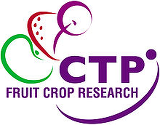REFERENCE: CTP_FCR_2021_8
Supervisors: Prof Timo Hytonen, Mr Adam Whitehouse, Dr Helen Cockerton (NIAB EMR); Jim Dunwell (University of Reading)
This student will be registered with the University of Reading. Beginning in October 2021, the successful candidate should have (or expect to have) an Honours Degree (or equivalent) with a minimum of 2.1 in Plant Science, Biology, or other related science subjects.
Background
Growers are increasingly interested in everbearing strawberry cultivars that enable continuous cropping throughout the growing season. However, significant trade-offs exist in fruit quality and runner production between everbearers and traditional ‘short day’ varieties. This may, in part, be due to the fact that the everbearing trait was introgressed from a single individual identified in a wild species of strawberry and is only now starting to permeate into the ‘elite’ gene pool. Our work has shown that, in contrast to earlier reports, everbearing is a complex trait, with multiple regions of the genome required to predict the expression of the trait. Further studies are needed to explore which allele combinations are needed for the uniform performance of everbearing lines throughout the season and for their ability to produce runners for vegetative propagation. Because of the complex genetics architecture of these traits, additional validation of existing markers and the development of new markers are needed to accurately select genotypes with uniform cropping and adequate runner production. These markers would also speed up the breeding of everbearing cultivars with improved fruit quality through crosses between everbearing genotypes and elite short-day types.
Objectives and approaches
The aim of this PhD project is to understand the genetic basis of the everbearing trait in strawberries and to develop reliable markers for the selection of optimised everbearing habit. Based on our genotypic data from across a large germplasm collection, a mapping population will be developed for fine mapping of the three loci controlling the everbearing trait. The detailed phenotypic analysis will be carried out to explore the effect of different allele combinations on flowering, fruiting and runner production throughout the growing season.
To understand the everbearing trait and its environmental regulation in more detail in octoploid strawberry, this studentship will participate in generating CRISPR-Cas9 gene-edited lines and analyse the most promising lines in controlled climatic conditions. Understanding the key molecular processes that underpin floral initiation in everbearing strawberries will facilitate the selection of high yielding lines and optimisation of the propagation processes, which in turn will deliver plant material to growers that has a higher yield potential and more uniform performance.
Training
The successful candidate will gain a wide range of experience in plant genetics, breeding, genomics and gene functional analysis.
Application
Anyone interested should fill the online application form before the deadline of 8th February 2021. If need further help or clarification, please contact recruitmentctp@emr.ac.uk.
Contact Prof Timo Hytonen for an informal discussion on research contents.
